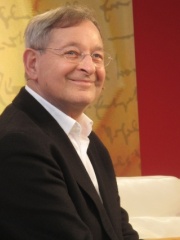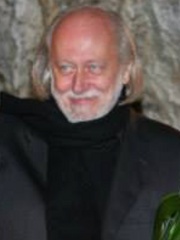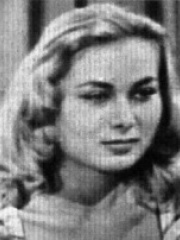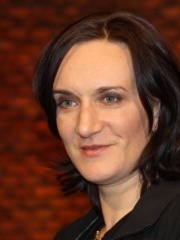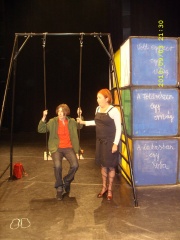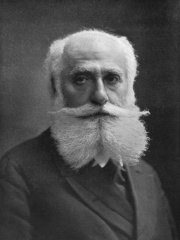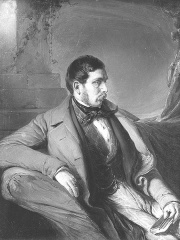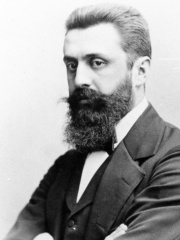
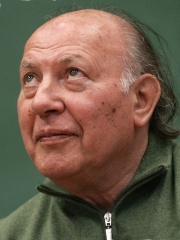
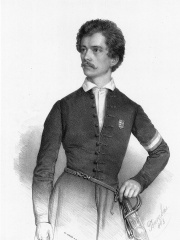
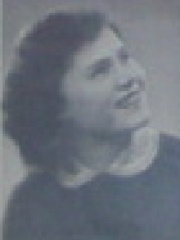
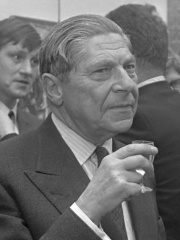
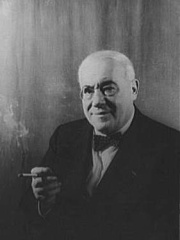
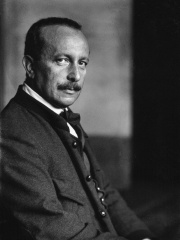
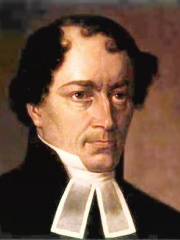
The Most Famous
WRITERS from Hungary
Top 10
The following people are considered by Pantheon to be the top 10 most legendary Hungarian Writers of all time. This list of famous Hungarian Writers is sorted by HPI (Historical Popularity Index), a metric that aggregates information on a biography's online popularity. Visit the rankings page to view the entire list of Hungarian Writers.

1. Theodor Herzl (1860 - 1904)
With an HPI of 81.04, Theodor Herzl is the most famous Hungarian Writer. His biography has been translated into 83 different languages on wikipedia.
Theodor Herzl (2 May 1860 – 3 July 1904) was an Austro-Hungarian Jewish journalist and lawyer who was the father of modern political Zionism. Herzl formed the Zionist Organization and promoted Jewish immigration to Palestine in an effort to form a Jewish state. Due to his Zionist work, he is known in Hebrew as Chozeh HaMedinah (חוֹזֵה הַמְדִינָה), lit. 'Visionary of the State'. He is specifically mentioned in the Israeli Declaration of Independence and is officially referred to as "the spiritual father of the Jewish State". Herzl was born in Pest, then part of the Kingdom of Hungary, to a prosperous Neolog Jewish family. After a brief legal career in Vienna, he became the Paris correspondent for the Viennese newspaper Neue Freie Presse. Confronted with antisemitic events in Vienna, he reached the conclusion that anti-Jewish sentiment would make Jewish assimilation impossible, and that the only solution for Jews was the establishment of a Jewish state. In 1896, Herzl published the pamphlet Der Judenstaat, in which he elaborated his visions of a Jewish homeland. His ideas attracted international attention and rapidly established Herzl as a major figure in the Jewish world. In 1897, Herzl convened the First Zionist Congress in Basel, Switzerland, and was elected president of the Zionist Organization. He began a series of diplomatic initiatives to build support for a Jewish state, appealing unsuccessfully to German emperor Wilhelm II and Ottoman sultan Abdul Hamid II. At the Sixth Zionist Congress in 1903, Herzl presented the Uganda Scheme, endorsed by Colonial Secretary Joseph Chamberlain on behalf of the British government. The proposal, which sought to create a temporary refuge for the Jews in British East Africa following the Kishinev pogrom, was met with strong opposition and ultimately rejected. Herzl died of a heart ailment in 1904 at the age of 44, and was buried in Vienna. In 1949, his remains were taken to Israel and reinterred on Mount Herzl.

2. Imre Kertész (1929 - 2016)
With an HPI of 78.20, Imre Kertész is the 2nd most famous Hungarian Writer. His biography has been translated into 90 different languages.
Imre Kertész (Hungarian: [ˈimrɛ ˈkɛrteːs]; 9 November 1929 – 31 March 2016) was a Hungarian author and recipient of the 2002 Nobel Prize in Literature, "for writing that upholds the fragile experience of the individual against the barbaric arbitrariness of history". He was the first Hungarian to win the Nobel in Literature. His works deal with themes of the Holocaust (he was a survivor of German concentration and death camps), dictatorship, and personal freedom.

3. Sándor Petőfi (1823 - 1849)
With an HPI of 73.87, Sándor Petőfi is the 3rd most famous Hungarian Writer. His biography has been translated into 66 different languages.
Sándor Petőfi (Hungarian: Petőfi Sándor [ˈpɛtøːfi ˈʃaːndor] ; né Petrovics; Slovak: Alexander Petrovič; Serbian: Александар Петровић; 1 January 1823 – most likely 31 July 1849) was a Hungarian poet and liberal revolutionary. He is considered Hungary's national poet, and was one of the key figures of the Hungarian Revolution of 1848. He is the author of the Nemzeti dal (National Song), which is said to have inspired the revolution in the Kingdom of Hungary that grew into a war for independence from the Austrian Empire. It is most likely, albeit unknown, that he died in the Battle of Segesvár, one of the last battles of the war.

4. Ágota Kristóf (1935 - 2011)
With an HPI of 73.56, Ágota Kristóf is the 4th most famous Hungarian Writer. Her biography has been translated into 42 different languages.
Ágota Kristóf (Hungarian: Kristóf Ágota; 30 October 1935 – 27 July 2011) was a Hungarian writer who lived in Switzerland and wrote in French. Kristóf received the "European prize" (Prix Europe, a.k.a. Prix Littéraire Europe, Grand Prix Littéraire Européen) from ADELF, the association of Francophone authors, for Le Grand Cahier (1986; later translated into English as The Notebook). It was followed by two sequels which are collectively The Notebook Trilogy. She won the 2001 Gottfried Keller Award in Switzerland and the Austrian State Prize for European Literature in 2008.
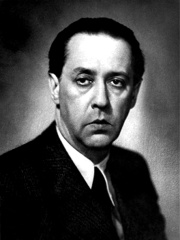
5. Sándor Márai (1900 - 1989)
With an HPI of 73.52, Sándor Márai is the 5th most famous Hungarian Writer. His biography has been translated into 45 different languages.
Sándor Márai (Hungarian: [ˈʃaːndor ˈmaːrɒi]; Archaic English name: Alexander Márai; 11 April 1900 – 21 February 1989) was a Hungarian writer, poet, and journalist.

6. Arthur Koestler (1905 - 1983)
With an HPI of 71.91, Arthur Koestler is the 6th most famous Hungarian Writer. His biography has been translated into 54 different languages.
Arthur Koestler (UK: , US: ; German: [ˈaʁtuːɐ̯ ˈkœstlɐ]; Hungarian: Kösztler Artúr [ˈkøstlɛr ˈɒrtuːr]; 5 September 1905 – 1 March 1983) was an Austro-Hungarian-born author and journalist. Koestler was born in Budapest, and was educated in Austria, apart from his early school years. In 1931, Koestler joined the Communist Party of Germany but resigned in 1938 after becoming disillusioned with Stalinism. Having moved to Britain in 1940, Koestler published his novel Darkness at Noon, an anti-totalitarian work that gained him international fame. Over the next 43 years, Koestler espoused many political causes and wrote novels, memoirs, biographies, and numerous essays. In 1949, Koestler began secretly working with a British Cold War anti-communist propaganda department known as the Information Research Department (IRD), which would republish and distribute many of his works, and also fund his activities. In 1968, he was awarded the Sonning Prize "for [his] outstanding contribution to European culture". In 1972, he was made a Commander of the Order of the British Empire (CBE). In 1976, Koestler was diagnosed with Parkinson's disease and in 1979 with terminal leukaemia. On 1 March 1983, Koestler and his wife Cynthia died of suicide together at their London home by swallowing lethal quantities of barbiturate-based Tuinal capsules.

7. Ferenc Molnár (1878 - 1952)
With an HPI of 70.78, Ferenc Molnár is the 7th most famous Hungarian Writer. His biography has been translated into 38 different languages.
Ferenc Molnár (US: FERR-ents MOHL-nar, -ənts -, - MAWL-, Hungarian: [ˈfɛrɛnt͡s ˈmolnaːr]; born Ferenc Neumann; January 12, 1878 – April 1, 1952), often anglicized as Franz Molnar, was a Hungarian-born author, stage director, dramatist, and poet. He is widely regarded as Hungary's most celebrated and controversial playwright. His primary aim through his writing was to entertain by transforming his personal experiences into literary works of art. While he never connected to any one literary movement, he did use the precepts of naturalism, neo-romanticism, expressionism, and Freudian psychoanalytic theories, so long as they suited his desires. According to Clara Györgyey, “By fusing the realistic narrative and stage tradition of Hungary with Western influences into a cosmopolitan amalgam, Molnár emerged as a versatile artist whose style was uniquely his own." As a novelist, Molnár is perhaps remembered best for The Paul Street Boys, the story of two rival gangs of youths in Budapest. It has been translated into 42 languages and adapted for the stage and film. It has been considered a masterpiece by many. However, it was as a playwright that he made his most significant contribution and how he is best known internationally. For Györgyey, "In his graceful, whimsical, sophisticated drawing-room comedies, he provided a felicitous synthesis of naturalism and fantasy, realism and romanticism, cynicism, and sentimentality, the profane and the sublime." Of his many plays, The Devil, Liliom, The Swan, The Guardsman, and The Play's the Thing endure as classics. His influences included luminaries such as Oscar Wilde, George Bernard Shaw, and Gerhart Hauptmann. Molnár's plays continue to be performed world-wide. His national and international fame has inspired many Hungarian playwrights, including Elemér Boross, László Fodor, Lajos Bíró, László Bús-Fekete, Ernő Vajda, Attila Orbók, and Imre Földes, among others. He immigrated to the United States to escape the persecution of Hungarian Jews during World War II and later adopted American citizenship. He died in New York City.

8. Felix Salten (1869 - 1945)
With an HPI of 69.56, Felix Salten is the 8th most famous Hungarian Writer. His biography has been translated into 44 different languages.
Felix Salten (German: [ˈzaltn̩]; 6 September 1869 – 8 October 1945) was an Austrian author and literary critic. His most famous work is Bambi, a Life in the Woods, which was adapted into an animated feature film, Bambi, by Walt Disney Productions in 1942.

9. Ján Kollár (1793 - 1852)
With an HPI of 68.53, Ján Kollár is the 9th most famous Hungarian Writer. His biography has been translated into 40 different languages.
Ján Kollár (Hungarian: Kollár János; 29 July 1793 – 24 January 1852) was a Slovak writer (mainly poet), archaeologist, scientist, Lutheran pastor, politician, and main ideologist of Pan-Slavism.
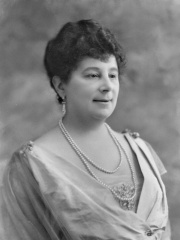
10. Emma Orczy (1865 - 1947)
With an HPI of 68.50, Emma Orczy is the 10th most famous Hungarian Writer. Her biography has been translated into 35 different languages.
Baroness Emma Magdalena Rozália Mária Jozefa Borbála Orczy de Orci (; 23 September 1865 – 12 November 1947), usually known as Baroness Orczy (the name under which she was published), was a Hungarian-born British novelist and playwright. She is best known for her series of novels featuring The Scarlet Pimpernel, the alter ego of Sir Percy Blakeney, a wealthy English fop who turns into a quick-thinking escape artist in order to save French aristocrats from "Madame Guillotine" during the French Revolution, establishing the "hero with a secret identity" in popular culture. Opening in London's West End on 5 January 1905, The Scarlet Pimpernel became a favourite of British audiences. Some of Orczy's paintings were exhibited at the Royal Academy in London. She established the Women of England's Active Service League during World War I with the intention of empowering women to convince men to enlist in the military. Orczy was also a founding member of the White Feather Movement, a shaming ritual in Britain during WW1 in which women gave white feathers to non-enlisting men, symbolising cowardice and shaming them into signing up.
People
Pantheon has 81 people classified as Hungarian writers born between 1250 and 1980. Of these 81, 8 (9.88%) of them are still alive today. The most famous living Hungarian writers include Péter Nádas, László Krasznahorkai, and László Polgár. The most famous deceased Hungarian writers include Theodor Herzl, Imre Kertész, and Sándor Petőfi.
Living Hungarian Writers
Go to all RankingsPéter Nádas
1942 - Present
HPI: 65.82
László Krasznahorkai
1954 - Present
HPI: 63.39
László Polgár
1946 - Present
HPI: 60.04
Edith Bruck
1931 - Present
HPI: 57.84
Joe Eszterhas
1944 - Present
HPI: 56.94
Terézia Mora
1971 - Present
HPI: 45.97
Krisztina Tóth
1967 - Present
HPI: 43.88
Henriett Seth F.
1980 - Present
HPI: 40.40
Deceased Hungarian Writers
Go to all RankingsTheodor Herzl
1860 - 1904
HPI: 81.04
Imre Kertész
1929 - 2016
HPI: 78.20
Sándor Petőfi
1823 - 1849
HPI: 73.87
Ágota Kristóf
1935 - 2011
HPI: 73.56
Sándor Márai
1900 - 1989
HPI: 73.52
Arthur Koestler
1905 - 1983
HPI: 71.91
Ferenc Molnár
1878 - 1952
HPI: 70.78
Felix Salten
1869 - 1945
HPI: 69.56
Ján Kollár
1793 - 1852
HPI: 68.53
Emma Orczy
1865 - 1947
HPI: 68.50
Max Nordau
1849 - 1923
HPI: 66.70
Nikolaus Lenau
1802 - 1850
HPI: 66.51
Overlapping Lives
Which Writers were alive at the same time? This visualization shows the lifespans of the 25 most globally memorable Writers since 1700.

